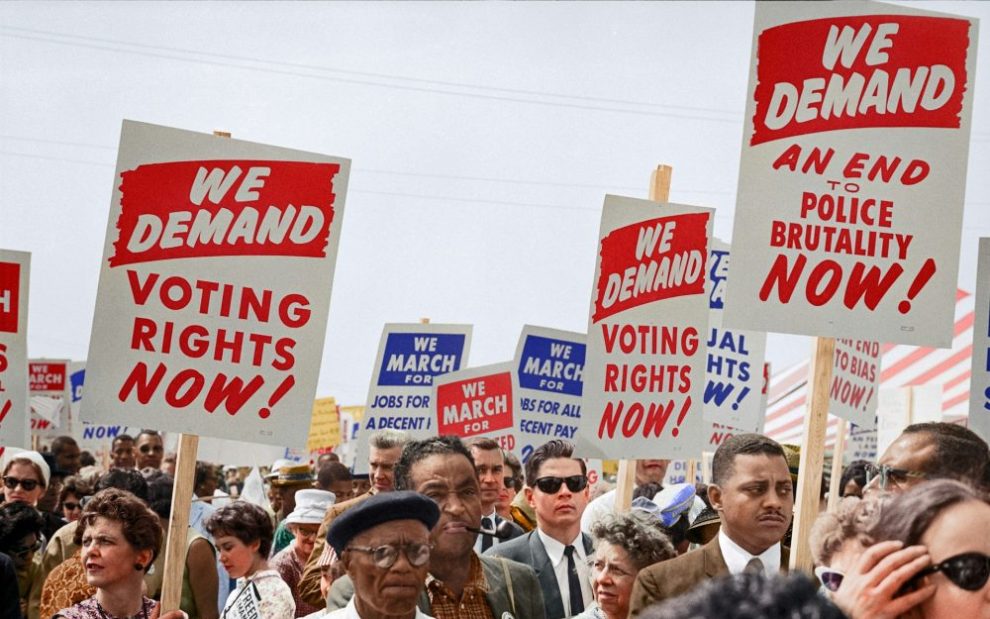On April 10, 2025, the U.S. House of Representatives passed the Safeguarding American Voter Eligibility (SAVE) Act. The proposed bill goes beyond requiring proof of citizenship for voting to mandate it for voter registration. It also gives American citizens a private right of action to sue election officials if they do not follow the proof of citizenship requirements. If it passes, the implications for voting rights are enormous.
The proposed bill currently requires voter registrants to show a REAL ID indicating their citizenship status. No state-issued REAL ID currently indicates citizenship, and non-citizen legal residents can obtain REAL IDs by presenting their green cards. Thus, the current bill effectively requires citizens to show their passports to register to vote.
If it becomes law, the SAVE Act make it harder to vote. Recently married and divorced women, as well as anyone else who’s name doesn’t match the name on their birth certificate—including men who have changed their names to marry, trans people, and adoptees—would have to get new passports. In addition to mail-in and online voter registration, all get-out-the-vote voter registration drives would cease. It would severely limit automatic voter registration at motor vehicle agencies.
History shows that legal restrictions on voting reflect moral decay in our nation. After the Civil War, the Republican-led Congress amended the U.S. Constitution to abolish slavery in 1865. In response to the Ku Klux Klan’s terrorization of formerly enslaved voters, they also amended the Constitution in 1868 to establish citizenship as a birthright and to guarantee equal protection under the law. In 1870, they amended the Constitution again to ensure voting rights for all U.S. citizens, regardless of race.
Alongside these Reconstruction Amendments, the presence of U.S. troops in the Confederate South enabled Black voters to elect Black officials at all government levels. However, white Republicans and Democrats engaged in the so-called “Compromise of 1877.” This compromise ended Congressional Reconstruction efforts, removed federal troops, and allowed states to disenfranchise Black voters using race-based restrictions. As a nation, we give up the fight for a more perfect union where every voice counts.
Over a century of terrorization and murder, Black Christians developed a Christian theological ethic that saw voting as a sacred right. In a 2021 address concerning voting rights, the Rev. Raphael G. Warnock articulated this Christian ethic on the Senate floor. Warnock is a trained systematic theologian and pastor of Atlanta’s historic Ebenezer Baptist Church, where the Rev. Martin Luther King Jr. served. He is also Georgia’s first Black Senator since the end of Reconstruction.
Warnock spoke for many Black Christians when he described democracy as “the political enactment of a spiritual idea” that every person is a child of God with a spark of the divine within and “therefore a right to help determine the country’s direction and [their] own destiny within it.” Voting is fundamental to expressing one’s God-given dignity in a democracy that embraces diverse voices.
A century after the Civil War ended, Black Christians took the political theology and ethics they developed in their churches to the streets and demanded a just society. On August 6, 1965, they persuaded the nation’s majority, Congress, and President Lyndon B. Johnson to pass the Voting Rights Act (VRA). The key provision of the VRA required that certain states and cities with a history of voter suppression obtain preclearance or approval from the U.S. Department of Justice or the U.S. District Court in D.C. before changing voting procedures.
By enforcing the VRA’s preclearance provisions, the Justice Department and D.C. Circuit Court eliminated race-based restrictions, increased the number of registered Black voters to nearly 1 million, and doubled the number of Black elected officials in four years. Given its undeniable success and ongoing challenges, a supermajority of Congress overwhelmingly extended the enforcement provision several times. The extensions allowed young Black Civil Rights leaders, such as John Lewis, to become Congress members and witness the election of the nation’s first Black President.
Two years before the VRA’s fifth anniversary, the U.S. Supreme Court struck down the VRA’s provision that determined the states and cities requiring preclearance. According to the Brennan Center, states passed more than 79 restrictive voting laws between 2021 and 2024. While most of these bills have no practical effect since they merely restrict voting to U.S. citizens, some laws broaden the list of crimes that disenfranchise otherwise eligible voters, criminalize the assistance of voters with mail-in ballots, create more steps for curing ballots, and mandate the purging of voters in certain cases. The SAVE Act goes beyond these state laws to nationalize limits on voting and voter registration.
As we commemorate the 60th anniversary of the VRA, all churches must preach the theological ethics developed in Black churches. Voting is a sacred right and cannot be a privilege reserved for the few Americans who can afford to pay hundreds of dollars to travel internationally. We may need to go beyond the VRA and call for amendments to the Constitution. Now is the time to reimagine the sacredness of voting, rethink the nature of our constitutional democracy, and reform our collective lives together.
Image: Unsplash/Unseen Histories














Add comment